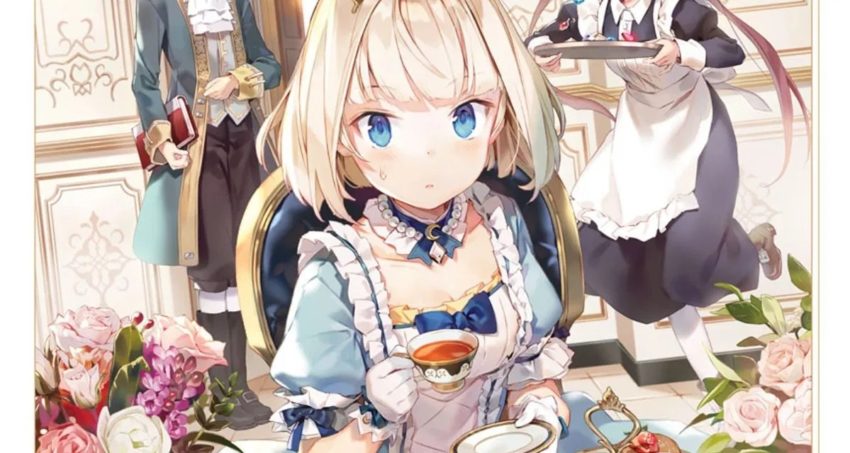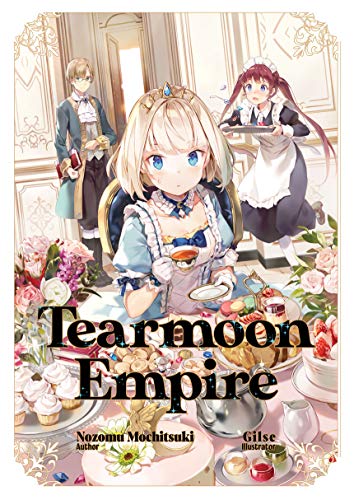Books: Tearmoon Empire
January 4, 2022 · 0 comments
By Jonathan Clements.

Then she woke up, and it was all a dream. Or was it? The teenage princess Mia Luna Tearmoon vividly recalls being eight years older, over-thrown in a revolution, enduring three years in prison and eventually being marched out to the scaffold, to be beheaded by a guillotine in front of a braying crowd of angry citizens. But now, here she is, thirteen years old again, as if nothing had ever happened.
Nozomu Mochitsuki’s novel Tearmoon Empire offers a tantalising prospect – a do-over for this fantasyland’s version of Marie Antoinette. Handing her the last decade of her life to live again, unexplained fates leave her with the bloodstained diary that her alternate self maintained right up until the day of her death, and a chance to do things better.
So many light novels amount to either retellings of computer-game experiences, or visions of fantasy worlds heavily inspired by such games. And Tearmoon Empire, for all its resonances of Groundhog Day and many a Peggy-Sue time-slip, might also be regarded by some of its readers as an exercise in respawning. You’ve lived that life once, and you cocked it up. How can you do better next time?
Mia went to the scaffold largely uncomprehending of her failings. She laughed at the starving peasantry and joked that alternate foodstuffs were surely available. She fired a chef for daring to serve her the mushrooms she didn’t like. She was, as they say in Scotland, a turbo-cow. Now, she re-lives her difficult teens with memories of real hardship – suddenly, after three years of prison food, she isn’t so picky at dinner.

Mia is kind to a palace maid, since she now “remembers” the kindness that maid had/would show to her in prison. She halts the transfer of a loyal official, whom she now knows was/will be crucial to maintaining the state finances. Remembering a plague that swept/will sweep through her city’s slums, she muses if there are any ways to stop it happening in the first place…
In other words, just as Ascendance of a Bookworm shows a character changing the world through the pursuit of a certain invention, and How a Realist Hero Rebuilt the Kingdom saves a nation through accountancy (no, really), Tearmoon Empire’s protagonist sets out to change her world by not being such a terrible bitch. The challenge is oddly gripping – could it truly be possible to change an entire timeline, to save her own life and presumably avert revolution and war, merely by being nicer to people? And if so, to what extent can she change a timeline, bearing in mind that the whole feudal system is still up and running, and people are presumably still starving, and agitators still agitating? Will there still be a revolution, but with a better outcome for her? Or is she going to die all over again, but respawn again ready to try once more?
Her blood-stained diary is the key, because every time she changes her behaviour, the words in it change to reflect that. She, and we, come to realise that for as long as the constantly changing diary remains blood-stained, that she is still facing the same ultimate fate. There is a faint glimmer of the old Mia, in the sense that everything she tries is initially just to save herself. But as the chapters march briskly along, it becomes clear that saving herself and saving her kingdom amounts to the same thing. Despite herself, she begins to comprehend the idea of noblesse oblige, that she, too, has royal responsibilities to her subjects.
All this reminds me of something that Terry Pratchett once said, that when he wrote the first draft of The Carpet People, he thought that fantasy was all about kings and queens and wars and stuff, but that as he got older, he realised that fantasy should be about doing without kings and queens, and avoiding wars. The heroine of Tearmoon Empire is caught in the middle of Pratchett’s process, still clinging to the machineries of privilege and power, but trying to enact a better world that may, still, find her to be superfluous to requirements.
Author Mochitsuki makes it abundantly clear that Mia has a lot to learn, not the least with an epilogue in which Mia’s rewritten diary comes scrawled with vainglorious bragging, and a staged interview between Mochitsuki and her leading character, in which Mia seems somewhat over-confident that she’s got this execution-avoiding thing all sorted.
Jonathan Clements is a Contributing Editor at the Encyclopedia of Science Fiction. Tearmoon Empire by Nozomu Mochitsuki, illustrated by Gilse, is published by J-Novel Club and available in the UK from Anime Limited.
Leave a Reply